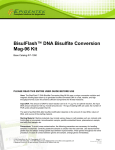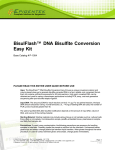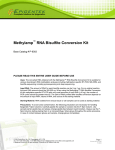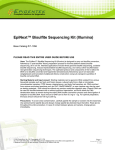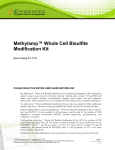Download BisulFlash ™ DNA Modification Kit
Transcript
EPIGENTEK Complete Solutions for Epigenetics BisulFlash™ DNA Modification Kit Base Catalog # P-1026 PLEASE READ THIS ENTIRE USER GUIDE BEFORE USE Uses: The converted DNA obtained with the BisulFlash™ DNA Modification Kit is suitable for various downstream methylation analyses including conventional MS-PCR, real time MS-PCR, MS-HRM, methylation microarray, and bisulfite-sequencing including pyrosequencing and deep-sequencing. Input DNA: The amount of DNA for each modification can be 0.2 ng-1 µg. For optimal modification, the input DNA amount should be 50-200 ng. If you use the BisulFlash™ DNA Modification Kit for MSP with extremely small amounts of starting DNA, the number of PCR cycles should be greater than 45. For the best PCR results, the target regions to be amplified should be less than 250 bp. The yield of DNA purified after bisulfite modification depends on the amount of input DNA, nature of DNA, and source of the starting material. Genomic DNA should be used for bisulfite modification without any previous restriction digest ion step. Plasmid DNA can be used for bisulfite treatment with or without previous linearization, as the kit allows for DNA denaturation status to remain during the entire DNA bisulfite conversion process. Starting Material: Starting materials may include various tissue or cell samples such as: cells from flask or microplate cultured cells microdissection sample, paraffin-embedded tissue, plasma/serum sample, and body fluid sample, etc. Precautions: To avoid cross-contamination, the following precautions are necessary for handling Epigentek F-Spin Columns: Carefully pipette the sample or solution into the F-Spin Column. Use aerosol-barrier pipette tips and always change pipette tips between liquid transfers. Always cap the FSpin Columns before placing them in a microcentrifuge. Wear gloves throughout the entire procedure. In case of contact between gloves and sample, change gloves immediately. 110 Bi County Blvd. Ste. 122, Farmingdale, NY 11735 Tel: 1-877-374-4368 ■ Fax: 1-718-484-3956 ■ E-mail: [email protected] ■ Web: www.epigentek.com © Epigentek Group Inc. All rights reserved. Products are for research use only. Page 1 Printed 2015-11-16 P-1026 EPIGENTEK Complete Solutions for Epigenetics KIT CONTENTS Component Amount BF1 (Conversion Mix Solution) 6 ml BF2 (Capture Solution) 15 ml BF3 (Desulphonation Solution) 60 µl BF4 (Elution Solution) 1 ml BF5 (Conversion Enhancer) 5 vials BF6 (Denaturation Enhancer) 600 µl F-Spin Column* 50 F-Collection Tube 50 User Guide 1 * Always cap spin columns b efore placing them in the microcentrifuge. SHIPPING & STORAGE The kit is shipped at ambient temperature. Store all components at room temperature (15-22°C) away from light. The kit can be stable for up to 6 months from the shipment date, when stored properly. Note: Check if there are any precipitates in the bottle of BF1 solution prior to use. If so, shake the bottle to re-dissolve it. Tightly cap BF1 after each opening or usage. MATERIALS REQUIRED BUT NOT SUPPLIED Thermal cycler with heated lid* *Since the bisulfite reaction is not overlaid with mineral oil, only thermal cyclers with heated lids are suitable for this procedure. Desktop centrifuge (up to 14,000 rpm) Pipette and pipette tips 0.2 ml PCR tubes 1.5 ml microcentrifuge tubes 90% ethanol 110 Bi County Blvd. Ste. 122, Farmingdale, NY 11735 Tel: 1-877-374-4368 ■ Fax: 1-718-484-3956 ■ E-mail: [email protected] ■ Web: www.epigentek.com © Epigentek Group Inc. All rights reserved. Products are for research use only. Page 2 Printed 2015-11-16 P-1026 EPIGENTEK Complete Solutions for Epigenetics GENERAL PRODUCT INFORMATION Quality Control: Each lot of BisulFlash™ DNA Modification Kits is tested against predetermined specifications to ensure consistent product quality. Epigentek guarantees the performance of all products in the manner described in our product instructions. Product Warranty: If this product does not meet your expectations, simply call our technical support unit or your regional distributor. We also encourage you to contact us if you have any suggestions about product performance or new applications and techniques. Safety: Suitable lab coat, disposable gloves, and proper eye protection are required when working with this product. Product Updates: Epigentek reserves the right to change or modify any product to enhance its performance and design. Usage Limitation: The BisulFlash™ DNA Modification Kit is for research use only and is not intended for diagnostic or therapeutic application. Intellectual Property: The BisulFlash™ DNA Modification Kit and methods of use contain proprietary technologies by Epigentek. A BRIEF OVERVIEW DNA methylation occurs by the covalent addition of a methyl group at the 5-carbon of the cytosine ring, resulting in 5-methylcytosine. There are various methods used to assess DNA methylation states. However, only bisulfite modification of genomic DNA, followed by PCR amplification, cloning, and sequencing of individual PCR amplimers yields reliable information on the methylation states of individual cytosines on individual DNA molecules. By treating DNA with bisulfite, cytosine residues are deaminated to uracil while leaving 5-methylcytosine intact: Unmethylated DNA Original Sequence After Bisulfite Conversion C-C-G-T-C-G-A-C-G-T U-U-G-T-U-G-A-U-G-T Methylated DNA C-MC-G-T-MC-G-A-MC-G-T U-MC-G-T-MC-G-A-MC-G-T The traditional bisulfite conversion method needs 12-16 h for bisulfite treatment, resulting in heavy DNA degradation (>80%), high inappropriate methylcytosine deamination (>3.5%) and low cytosine conversion rate (<95%). In March 2005, Epigentek became the first company to develop a fast DNA bisulfite modification method to overcome these problems – shortening the entire bisulfite process from 16 hours to just 1.5 hours, significantly improving cytosine conversion efficiency (>99.9%), and effectively preventing converted DNA degradation. To effectively and efficiently prepare converted DNA for use in various downstream analyses, an ideal DNA bisulfite modification method should be (1) highly accurate to allow for the complete conversion of cytosine to uracil (correct conversion) without deamination of methylcytosine to thymine (inappropriate conversion); and (2) rapid enough to enable the bisulfite process to be as short as possible, as rapid DNA methylation analysis is highly demanded for basic research and particularly for clinical applications. Epigentek continues to innovate with the development of the BisulFlash™ DNA Modification Kit, perfecting DNA bisulfite treatment for better DNA methylation analysis. This kit greatly improves the currently used methods/kits for DNA bisulfite modification. With the novel and optimized bisulfite composition, the BisulFlash™ DNA Modification Kit allows for the DNA modification step to be just 20 110 Bi County Blvd. Ste. 122, Farmingdale, NY 11735 Tel: 1-877-374-4368 ■ Fax: 1-718-484-3956 ■ E-mail: [email protected] ■ Web: www.epigentek.com © Epigentek Group Inc. All rights reserved. Products are for research use only. Page 3 Printed 2015-11-16 P-1026 EPIGENTEK Complete Solutions for Epigenetics minutes with a complete cytosine conversion. More importantly, it greatly reduces inappropriate conversion of 5-methylcytosine to thymine (<0.1%). The BisulFlash™ DNA Modification Kit is suitable for MS-PCR, real time MS-PCR, methylation microarray and bisulfite-sequencing including pyrosequencing and deep-sequencing. The BisulFlash™ DNA Modification Kit has the following advantages and features: Convenient single temperature incubation without the need for a separate DNA denaturation step. The fastest and most convenient protocol that can be finished in as short as 30 minutes. Completely converts unmethylated cytosine into uracil (>99.9%) with negligible inappropriate or error conversion of methylcytosine to thymine (<0.1%). Powerful protection against DNA degradation, with over 90% of DNA loss prevented. Extremely low requirement of input DNA for modification – only 0.2 ng or 50 cells. Simple, reliable, and consistent modification conditions PRINCIPLE & PROCEDURE As a next generation bisulfite conversion tool, the BisulFlash™ DNA Modification Kit contains all reagents required for an ultra-fast bisulfite conversion on a DNA sample. With the unique conversion mix solution which contains powerful DNA protection reagents, DNA denaturation status is sustained throughout the entire bisulfite DNA conversion process, thereby enabling 100% of DNA to be modified in single stranded form without chemical and thermophilic degradation. Thus, this novel approach leads to an accelerated conversion of all cytosine to uracil with negligible methylcytosine deamination. The non-toxic DNA capture solution enables DNA to tightly bind to the column filter, thus DNA cleaning can be carried out on the column to effectively remove residual bisulfite and salts. Schematic procedure of the BisulFlash™ DNA Modif ication Kit to obtain conv erted DNA. 110 Bi County Blvd. Ste. 122, Farmingdale, NY 11735 Tel: 1-877-374-4368 ■ Fax: 1-718-484-3956 ■ E-mail: [email protected] ■ Web: www.epigentek.com © Epigentek Group Inc. All rights reserved. Products are for research use only. Page 4 Printed 2015-11-16 P-1026 EPIGENTEK Complete Solutions for Epigenetics ASSAY PROTOCOL For the best results, please read the protocol in its entirety prior to starting your experiment. Starting Materials Input DNA Amount: DNA amount can range from 200 pg to 1 μg per reaction. An optimal amount is 50–200 ng per reaction. Starting DNA may be in water or in a buffer such as TE. DNA Isolation: You can use your method of choice for DNA isolation. Epigentek offers a series of genomic DNA isolation kits for your convenience. DNA Storage: Isolated genomic DNA can be stored at 4°C or -20°C until use. Bisulfite DNA Conversion 1. Add 1 ml of BF1 to 1 vial of BF5. Mix by inverting and shaking the vial repeatedly for 2 min. Add 80 μl of BF6 to the vial and mix by inverting and shaking for an additional 3 min (trace amount of undissolved BF5 may remain, which is normal as BF5 is saturated in solution). 2. For each 0.2 ml PCR tube, add 110 μl of the mixed BF1/BF5/BF6 solution followed by adding 1-5 μl of DNA solution. Note: Check (1) if there are precipitates in BF1 solution bottle before adding it to the vial. If so, shake the bottle to re-dissolve it; and (2) if DNA volume is large and concentration is lower than 10 ng/μl, it is recommended to concentrate DNA using Epigentek’s DNA Concentrator Kit (Cat. No. P -1006) prior to bisulfite treatment. Prepared BF1/BF5/BF6 solution can be stored at room temperature for up to 2 week s without significant loss of efficiency. For the best results, the mixed solution should be used immediately. 3. Tightly close the PCR tubes and place them in a thermal cycler with heated lid. Program and run the thermal cycler at 95°C for 20 min*. Note: If the DNA template contains high GC region or secondary structure, the following program for sequencing can be used instead. *Alternative Enhanced Program for Ideal Sequencing Results (Optional): 95°C 4 min 65°C 30 min 95°C 4 min 65°C 30 min 95°C 4 min 65°C 60 min Hold 18-20°C up to 6 h Meanwhile, insert the number of F-Spin Columns (“column”) into F-Collection Tubes (“collection tube”) as needed by your experiment. Converted DNA Clean-Up 110 Bi County Blvd. Ste. 122, Farmingdale, NY 11735 Tel: 1-877-374-4368 ■ Fax: 1-718-484-3956 ■ E-mail: [email protected] ■ Web: www.epigentek.com © Epigentek Group Inc. All rights reserved. Products are for research use only. Page 5 Printed 2015-11-16 P-1026 EPIGENTEK Complete Solutions for Epigenetics 4. Add 250 µl of BF2 to each column. Then transfer the samples from each PCR tube (from Step 2) to each column containing the BF2. Centrifuge at 12,000 rpm for 30 sec. Remove columns from collection tubes and discard the flowthrough. Place columns back into collection tubes. 5. Add 200 µl of 90% ethanol solution to each column. Centrifuge at 12,000 rpm for 20 sec. 6. Prepare final desulphonation buffer by adding 12 µl of BF3 to every 1 ml of 90% ethanol, and mix. Add 60 µl of the final desulphonation buffer (BF3 and 90% ethanol mixture) to each column. Allow columns to sit for 8 min at room temperature, then centrifuge at 12,000 rpm for 20 sec. Remove columns from collection tubes and discard the flowthrough. Place columns back into collection tubes. 7. Add 200 µl of 90% ethanol to each column. Centrifuge at 12,000 rpm for 20 sec. Remove columns from collection tubes and discard the flowthrough. Place columns back into collection tubes. Add 200 µl of 90% ethanol to each column again and centrifuge at 12,000 rpm for 30 sec. 8. Insert each column into a new 1.5 ml tube. Add 10-20 µl of BF4 directly to each column’s filter membrane. Centrifuge at 12,000 rpm for 30 sec to elute converted DNA. Modified DNA is now ready for use, or storage at or below –20°C for up to 6 months. We recommend using 1–2 μl of the DNA for each real time qPCR and 2-4 μl for each end-point PCR. Methylation specific-real time PCR can be performed by using your own successful method. For your convenience and the best results, Epigentek offers the Methylamp™ MS-qPCR Fast Kit that is optimized for fast methylation specific qPCR reactions in 70 minutes (see “Working with Methylation Specific qPCR”). WORKING WITH METHYLATION SPECIFIC qPCR When working with MS-qPCR, we recommend using the Methylamp™ MS-qPCR Fast Kit (Cat. No. P1028) which contains a hot start polymerase system and has been optimized to decrease the overall methylation specific-qPCR amplification time. The master mix is provided at 2X concentration for easier preparation of PCR reactions requiring only the addition of primers and templates. With this kit, the MS-qPCR can be finished in as short as 70 min. Prepare the PCR Reactions Component Size (µl) Final Concentration Methylamp Master Mix (2X) 10 µl 1X Forward Primer 1 µl 0.4-0.5 µM Reverse Primer DNA Template 1 µl 1-2 µl 0.4-0.5 µM 50 pg-0.1 µg DNA/RNA-free H 2O Total Volume 6-7 µl 20 µl For the negative control, use DNA/RNA-free water instead of DNA template. Program the PCR Reactions Cycle Step Activation Temp 95°C Time 7 min Cycle 1 110 Bi County Blvd. Ste. 122, Farmingdale, NY 11735 Tel: 1-877-374-4368 ■ Fax: 1-718-484-3956 ■ E-mail: [email protected] ■ Web: www.epigentek.com © Epigentek Group Inc. All rights reserved. Products are for research use only. Page 6 Printed 2015-11-16 P-1026 EPIGENTEK Complete Solutions for Epigenetics Cycling 95°C 55°C 72°C 10 sec 10 sec 8 sec 40-45 Final Extension 72°C 1 min 1 TROUBLESHOOTING Problem Possible Causes Suggestions DNA is Poorly Modified Poor DNA quality (DNA is severely degraded). Check if the sample DNA 260/280 ratio is between 1.6-1.9 and if DNA is degraded by running gel. Too little DNA or too much DNA (i.e., < 100 pg or >1 µg). Increase or decrease input DNA to within the correct range, or to the optimal amount of 50-200 ng. Template contains high GC region or secondary structure. Increase the thermal cycler program time by 5-10 min in Step 3. Temperature or thermal cycling condition is incorrect. Check for appropriate temperature or thermal cycling conditions. Insufficient DNA clean-up. Ensure that 12 µl of BF3 is added into every 1 ml of 90% ethanol in Step 6. Solution BF1 contains precipitates. Check if there are precipitates in the bottle of BF1 solution prior to adding it to the tube. If so, shake the bottle until redissolved. Solution BF1 was contaminated by other chemicals or affected by long-term exposure to air. Check if BF1 solution has any color change (deep yellow or brown) or indissoluble precipitates. If so, use/order new BF1 solution. Kit is not stored or handled properly. Store all components of the kit at room temperature. Tightly cap the BF1 solution after each opening or use. Poor input DNA quality (degraded). Check if DNA is degraded by running gel. Buffer BF2 (Capture Solution) is not added into the sample. Ensure that BF2 is added in Step 4. Concentration of ethanol solution used for DNA clean-up is not correct. Use 90% ethanol for DNA clean-up. Sample is not completely passed through the filter membrane of column. Centrifuge for 1 min at 12,000 rpm or until the entire sample has passed through the filter membrane. Little or no PCR product even in positive control. Ensure that all PCR components were added and that suitable PCR program is used (PCR cycle should be >40). Eluate Contains Little or No DNA Poor Results in Downstream Methylation-Specific 110 Bi County Blvd. Ste. 122, Farmingdale, NY 11735 Tel: 1-877-374-4368 ■ Fax: 1-718-484-3956 ■ E-mail: [email protected] ■ Web: www.epigentek.com © Epigentek Group Inc. All rights reserved. Products are for research use only. Page 7 Printed 2015-11-16 P-1026 EPIGENTEK Complete Solutions for Epigenetics PCR PCR primers and probes were not appropriate or were incorrectly designed. Ensure the primer and probes are suitable for MS-PCR and the target regions to be amplified are less than 250 bps. Ensure the amount of template DNA used in PCR was sufficient. Significant non-specific PCR products. Failed bisulfite conversion. Ensure that all steps of the modification and cleanup protocol were followed and that input DNA amount is within the recommended range. Primers and probes are not specific for converted DNA and target genes. Check the primer and probe design. RELATED PRODUCTS DNA Sample Preparation P-1003 FitAmp™ General Tissue Section DNA Isolation Kit P-1004 FitAmp™ Plasma/Serum DNA Isolation Kit P-1006 DNA Concentrator Kit P-1007 FitAmp™ Gel DNA Isolation Kit P-1009 FitAmp™ Paraffin Tissue Section DNA Isolation Kit P-1017 FitAmp™ Urine DNA Isolation Kit P-1018 FitAmp™ Blood and Cultured Cell DNA Extraction Kit DNA Bisulfite Modification P-1002 Methylamp™ Coupled DNA Isolation & Modification Kit P-1008 Methylamp™-96 DNA Modification Kit P-1016 Methylamp™ Whole Cell Bisulfite Modification Kit DNA Methylation Analysis P-1005 TuMinute™ PCR Clean-Up Kit P-1011 Methylamp™ Universal Methylated DNA Kit P-1019 Methylamp™ Universal Methylated DNA Preparation Kit P-1028 Methylamp™ MS-qPCR Fast Kit 110 Bi County Blvd. Ste. 122, Farmingdale, NY 11735 Tel: 1-877-374-4368 ■ Fax: 1-718-484-3956 ■ E-mail: [email protected] ■ Web: www.epigentek.com © Epigentek Group Inc. All rights reserved. Products are for research use only. Page 8 Printed 2015-11-16 P-1026








